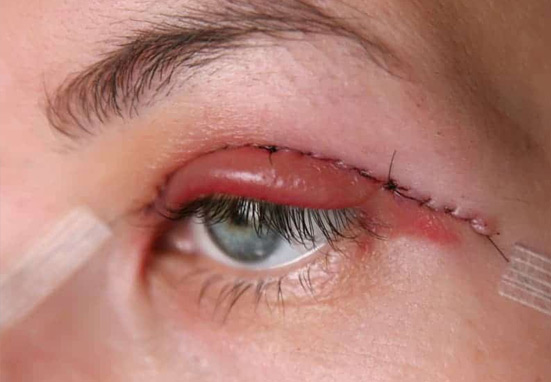Blepharoplasty aftercare instructions

Eyelid surgery or blepharoplasty is a type of cosmetic surgery that does not require anesthesia and hospitalization for several days. With the doctor's decision, you can return home the same day without being hospitalized. Although this operation is not as heavy as surgery on other parts of the body, but like any other operation, it requires a recovery period. In this article, we will discuss the necessary blepharoplasty aftercare instructions and we will describe in detail the cases and actions that will help you recover faster.
By taking care and following the advice of your surgeon, you can have a healthy recovery period and see the results of your cosmetic surgery after a while.
blepharoplasty aftercare instructions

For some people, the recovery period can be long and exhausting. Due to the fact that the eyes play an important role in facial beauty and eyelid surgery directly affects this area, many candidates for eyelid surgery are in a hurry to see the effect of cosmetic surgery on their eyelids as soon as possible. It should be noted that improvement and observation of results occur over time.
After you leave the clinic, someone will have to take you home. It is better not to be alone for the first two days after the operation. On the first night after surgery, the eyes are bandaged. Most of the discomfort and pain are related to the first few days after the operation, but over time, these discomforts decrease and their effect diminishes.
The stitches are usually removed one week after the operation, and bathing should be done from the neck down as long as the dressing or ester strips remain. But after that, taking a full bath and using shampoo for hair is not an obstacle.
You may feel that one of your eyes or eyebrows does not match the other after surgery. This may be due to the inconsistency of surgical wound healing in each eyelid, and may be confused with the complication of ocular asymmetry in non-standard eyelid surgery. If the asymmetry of the eyes is due to a defect in the surgery, it will show in the months after the surgery and recovery.
It should be noted that in eyelid surgery, the layers and tissues under the eyelid skin are also altered and manipulated, and their wound healing takes time. The process of healing underlying wounds is usually longer and slower. This is why the eyelids usually look hard and constricted during this time and do not open completely. But after about 4 to 6 months, this case disappears.
Small Tips after blepharoplasty surgery

- Gently wash with soap and water daily when cleaning the surgical site.
- You can use contact lenses after two weeks.
- Avoid rubbing and squeezing the eyes for the first two weeks after surgery.
Do you need pain meds after eyelid surgery?

Take the medications and painkillers prescribed by your doctor on time and regularly. Do not take aspirin or similar medications unless your doctor tells you to.
First, after the operation, you will feel a stretch in the eyelids. Irritation, dryness and itching of the eyes are also common at this time. You may also have eye discharge for about a week. To improve this condition, your doctor will usually prescribe eye drops, such as artificial tears. During the first week, you should keep your eye activity low. Use prescribed eye drops and ointments regularly to prevent dry eyes and infection.
To relieve the feeling of stretch in the eyelid, your doctor will usually prescribe lubricating ointments to reduce the discomfort when blinking. Also, antibiotic ointments that are applied topically to the stitches and eyes can cause blurred vision. The use of these ointments continues for a few days after surgery and blurred vision is normal during this period.
Anesthesia or tingling in the surgical site may occur. It may also be uncomfortable to feel the incisions and stitches. During all this time, you can use vitamin E lubricating creams to relieve the feeling of dry eyelids at the surgical site, in consultation with your doctor.
Some people also believe that using natural ingredients such as aloe vera gel has a great effect on fading the wound. In consultation with your doctor, you can also use these natural ointments to remove the incision and suture of your eyelid.
In the first few weeks after surgery, the eyes are sensitive to light, wind, or the like. It is better to use special eye protection so that they are not damaged when exposed to various factors. After this time, you can use creams and cosmetics to cover the bruises until they are completely gone.
Remember that surgical wounds should not be exposed to sunlight for 12 months without protection. Be sure to use sunscreen with an SPF of 30 or higher and wear sunglasses when leaving the house.
How do you sleep after blepharoplasty?

You may have tears, blurred vision, or diplopia in the first few weeks after surgery when your eyes are sensitive. Also feel uncomfortable when sleeping and closing your eyelids. Rest well during this time.
When resting and sleeping, lie on your back, using a few pillows under your head so that your head is at a 45-degree angle to your body and above it. This helps to improve the swelling of the eyelids.
What to eat after surgery to heal faster?

Eat a healthy and light diet. In the first two days after the operation, use soft foods, such as soup, in addition to its positive effect on the body and digestive system, the involvement and activity of facial muscles is also low.
Use fresh vegetables and fruits in your meals to reduce the effects of painkillers, dehydration and inactivity on your digestive system. Do not forget to drink fluids. These two reduce the risk of blood clots in the body and help improve the function of the digestive system.
Remember to abstain from alcohol for three weeks. Also, avoid smoking or approaching a person who is smoking, as cigarette smoke has many negative effects on the healing process.
How long after blepharoplasty can I go to work?

In most cases and in surgeries that are not very heavy, you can return to your normal activities and workplace after the first week. There is nothing wrong with working and resuming activities after the first two weeks. But continue to avoid strenuous physical activity in the second to fourth weeks.
Try to start walking as soon as possible, do not forget that bending, crying and strenuous activity also have a negative effect on the healing of the eyelids. Postpone activities such as driving or activities that require a lot of concentration while you are taking medication and painkillers.
Avoid doing exercises such as sit-ups or activities such as lifting heavy objects that raise blood pressure for two to three weeks.
Also, avoid looking at screens such as TVs and cell phones, or reading books and newspapers for two to three days after surgery. Also, reduce these activities in the first week after surgery to prevent dry eyes.
blepharoplasty swelling and bruising

In the first 24 hours after surgery, apply an ice pack to the eyelids to reduce swelling and bruising. Apply an ice pack on the eyelids for ten to 15 minutes, wait 15 minutes and repeat.
In the first two to three days after surgery, it is normal to feel pain, tightness and stretch of the eyelids. During this time, you may see black or dark circles under your eyes. Blurring under the eyes is usually a complication of eyelid surgery and goes away over time, but if it persists, it may be due to damage to the subcutaneous tissue, in which case it requires a doctor's examination.
Swelling and bruising of the eyes last for about two weeks. During the four weeks after surgery, bruising and swelling gradually subside and the wound heals gradually. In this way, the incision site is slightly red at first and its texture is thick. At this stage, small white milia or cysts may be seen on the eyelid incision area, which are not dangerous but will go away on their own. But your doctor can also easily remove these cysts with small syringes.
Rapid eye fatigue is normal in the postoperative period. Try to blink for a long time and do not put any pressure on your eyes.
Common problems with blepharoplasty

In general, by following the recommendations and post-surgery care given to you by your doctor, you will easily pass the recovery period. However, it should be noted that if you experience the following symptoms during this period, you should inform your doctor immediately:
- Swelling and bruising do not improve or increase after a few days.
- You have severe pain that cannot be relieved with painkillers and other medications.
- You may experience allergies and allergic reactions such as nausea, vomiting, chills, or headaches when taking medications and drops prescribed by your doctor.
- You have a fever above 38 degrees.
- A yellow or green discharge or an unpleasant-smelling discharge comes out of the surgical incision.
- Bleeding occurs from the surgical site so that it cannot be stopped.
- You have numbness and immobility.
- You have trouble breathing.
- Except for severe reactions and the like, eyelid surgery is well spent following the surgeon's care recommendations.
- Revealing the cosmetic results of eyelid surgery is a time-consuming process and the final results may be well visible after a year. But after 6 months, the surgical wound heals a lot and usually only a pink mark remains.
Finally, it should be noted that a large part of the results of eyelid cosmetic surgery and its significant effect on facial beauty is related to the recovery period after surgery. During this time, do not wait for the results of the surgery to be observed, take care of your eyes carefully, constantly adhere to your doctor's care instructions, and share any ambiguities, questions, or changes in your condition with him. The doctor will guide you to the best way to pass this course with his advice and instructions.
source : whcl.ir












